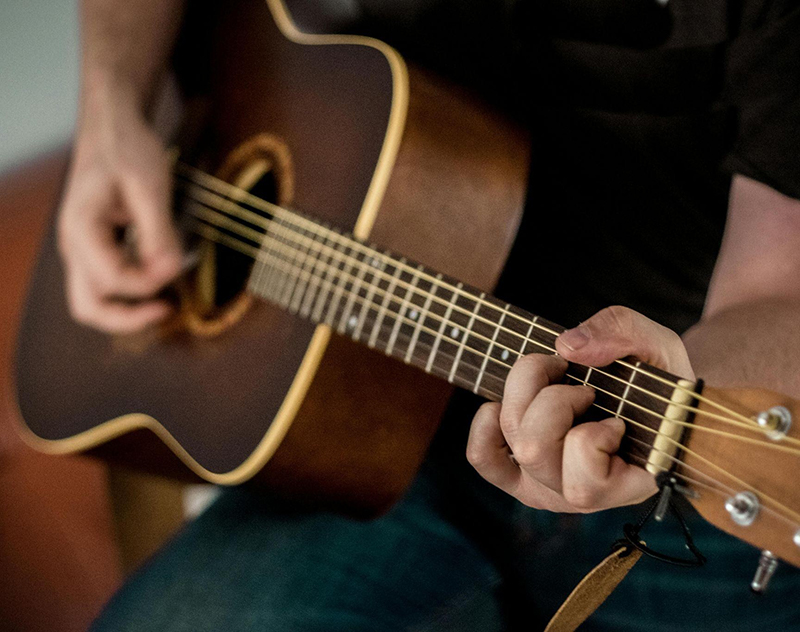Hey there, young musicians!
Do you ever feel a mix of excitement and butterflies in your stomach right before you perform? How about shaking hands or sweating? It’s totally normal to feel a bit nervous when you’re about to share your music with others. Even world famous performers will, sometimes, experience stage fright! But don't worry - we’ve got some awesome tips to help you feel more confident when you’re performing, ensuring you can enjoy every moment on stage.

1. Practice, Practice, Practice!
Know Your Music:
This may seem obvious, but the more practice you put into a song, the more confident you will feel on stage. Each time you practice, you’re improving your skills, building muscle memory, and getting more comfortable with the piece of music you are playing.
Try to Practice in Different Ways:
Try playing your piece while looking in the mirror, recording yourself, or even performing for your family. This way, you get used to playing in front of others, and it can be fun for others and yourself to hear you progress over time. Although many of us may not feel nervous performing in front of our family, the simple act of performing for someone will help make a performance in front of strangers less intimidating.

2. Breathe and Relax
Deep Breathing:
Deep Breathing: Before you step onto the stage, try taking slow, deep breaths. Imagine you’re inflating a big balloon with each breath. Breathing deeply can help calm your nerves and remind your body to relax. I personally use the “Box Breathe” technique when I’m back stage and about to perform. This is a simple technique that can force your body to leave a nervous or anxious state, allowing you to return to a more neutral physical state in your body. The technique only requires that you know how to count to four!
- You begin by inhaling through your nose for four seconds.
- Then hold this breath for another four seconds.
- Exhale through your mouth for four seconds.
- Then hold for four seconds while you have no air in your chest.
Stretch and Wiggle:
Sometimes a little stretching or a fun dance can help shake off the jitters. Wiggle your arms, stretch your fingers, and imagine you’re shaking off all the nervous energy. I know a classical guitarist who does push-ups off stage before he performs to help with his nerves. You might even make your own fun pre-performance dance or tradition!

3. Imagine a Happy Audience
Picture a Friendly Crowd:
Close your eyes for a minute and imagine the audience smiling, clapping, and cheering for you. Visualizing happy faces can boost your confidence and make you feel like you have a team of friends rooting for you. An audience is not watching to boo and throw tomatoes at your performance. They’re there to enjoy your performance and a few missed notes won’t ruin the music for an audience.
Friendly Faces:
If you’re really nervous, try to spot a familiar face in the crowd. This could be a teacher, a family member, or a friend - and imagine them giving you a thumbs-up. Their smile will help remind you that you’re doing great!
4. Start Small and Build Up
Little Steps:
If you’re just starting out, try performing in front of a small, supportive group first. This might be a classroom presentation, a school recital, or even a family gathering. As you build your confidence, you can gradually play in front of more people.

Celebrate Every Step:
Every time you perform, even in a small setting, give yourself a high-five! Each step you take is a big accomplishment that helps you grow as a musician. Celebrating your accomplishments, no matter how big or small, can help you feel more excited and confident for future performances, reminding you of how well you did!
5. Focus on the Music, Not the Mistakes
Share Your Passion:
Remember, you’re on stage to share something wonderful - your music! Focus on how much you love playing your instrument or on your singing, and let that joy fill you up. When you think about the happiness your music brings, it’s easier to forget about the nerves.
Mistakes Happen:
You will make mistakes! Every performer makes mistakes but the professional hides it well enough that a general audience won’t notice. Even the best musicians sometimes hit a wrong note or stumble over a lyric. And guess what? That’s perfectly okay! Every mistake is a chance to learn and become an even better performer. Imagine a mistake as a tiny bump on your musical adventure - just keep going and have fun with it.
6. Create a Pre-Performance Routine
Find Your Own Ritual:
Many musicians have a little routine they do before going on stage. Maybe it’s listening to your favorite song, doing a fun handshake with a friend, or even saying a special cheer to yourself. Find something that makes you feel brave and ready to shine.
Routine Examples:
- Warm-Up: Play a few scales or your favorite riff, or sing a few vocal warmups.
- Favorite Tune: Listen to a song that makes you feel happy and confident.
- Cheer Up: Say a positive phrase like “I’ve got this!”
7. Have Fun and Smile
Enjoy the Moment:
Performing is a chance to show everyone what makes your music special. When you smile and enjoy yourself, your audience will feel your energy and cheer you on even louder!
Make It a Celebration:
Think of each performance as a mini celebration of your hard work and creativity. You’ve spent time practicing and perfecting your music, and now it’s your moment to shine. Celebrate every note, every beat, and every smile in the crowd.
8. Talk to Others About Your Feelings
Share Your Experience:
Sometimes, just talking about your nervousness can help a lot. Chat with your music teacher, a friend, or even your parents about how you’re feeling before a performance. They might share their own stories about stage fright and give you extra tips to feel calm.
Ask for Advice:
Remember, you’re never alone. Other musicians have felt the same way, and they might have great advice or fun ideas to help you get through those nerves.
9. Practice Mindfulness and Stay Present
Stay in the Moment:
Try to focus on the present moment rather than worrying about what might go wrong. When you’re playing your instrument or singing, pay attention to each note and enjoy the music. Being mindful can help you feel more in control and less anxious.
Mindfulness Fun:
You can even turn mindfulness into a game - try to notice every little sound in your music or feel every vibration from your instrument. It turns your performance into a special exploration of sound!
Final Thoughts
Every musician, no matter how famous or talented, faces a little stage fright sometimes. The key is to practice, believe in yourself, and enjoy the amazing experience of sharing your music with others. Each performance is a new adventure, a chance to learn, grow, and shine a little brighter.
So next time you’re about to perform, remember these tips, take a deep breath, and let your love for music fill the room. You're not just playing notes; you're sharing a piece of your heart with the world. Happy playing, and keep rocking out on stage!

